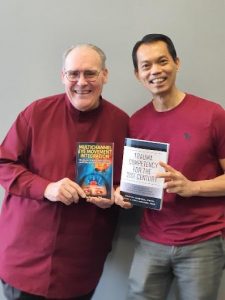Neurodiversity is complicated, misunderstood and often seen as something to be “fixed” or even “cured”. Get a glimpse on the salutogenic approach towards neurodiversity and its effectiveness in this article by Dr. Robert Rhoton, CEO of Arizona Trauma Institute.
Special contribution from Dr Robert Rhoton, Psy D., LPC, F.A.A.E.T.S.
A Better Way to Interact with Neurodiversity
Using The Salutogenic Approach
Neurodiversity is complicated and often misunderstood.
Oftentimes, people with neurodiversity’s are wrongly labelled or stigmatized—sometimes even by those who are close to them. There’s a better way to interact with these individuals by using a salutogenic approach. This approach prioritizes understanding, compassion, and acceptance rather than stigma, traumatization, or disenfranchisement.
The salutogenic approach focuses on actively seeking out and responding to positive aspects of daily life experiences. It considers both individual assets, resources and strengths as well as the environment in which they live. This approach can be used in any situation where an individual encounters something unfamiliar or challenging, whether it be a change of job or the diagnostic label of a neurodiversity-related disorder. By focusing on potential competencies, assets and capacity rather than potential problems, this method helps reduce stress levels and builds resilience in individuals.
Today’s society, neurodiversity is often seen as something that needs to be “fixed” or “cured” rather than accepted for what is — a unique part of the human experience. By using the salutogenic approach instead of adhering to traditional “fix-it” approaches, we can help create an environment where neurodiverse people feel seen and respected for their differences instead of ostracized for them.
The salutogenic approach requires us to shift our focus from negative labels and stereotypes towards understanding and acceptance of others—no matter how different they may seem from us at first glance. It starts with being open-minded and non-judgmental when engaging with someone different from ourselves; listening without assumptions; offering support without trying to change anyone; and respecting everyone’s right to have their own opinion or perspective on any given topic—even if it differs from our own.
When I first came across the salutogenic approach it revolutionized my practice and interactions with others. It more than any other modality helped me to interact with people who are neurodiverse in a respectful way that avoids stigma, re-traumatization, and disenfranchisement. Rather than trying to “fix” someone who has been diagnosed with a disorder or disability related to neurodiversity, this method encourages us to listen without assumptions; offer support without trying to change anyone; respect everyone’s right to have their own opinion or perspective; and understand that different does not necessarily mean wrong or bad. By using this humane model of engagement with others we can create an environment where all forms of neurodiversity are celebrated for their unique abilities and beauty instead of judged for their perceived flaws.

Dr. Robert Rhoton, CEO of Arizona Trauma Institute and President at the Trauma Institute International possesses a rich history of experience in the mental health field and works internationally with organizations to improve the delivery of trauma treatment services. Dr. Rhoton is EMCC’s in-house mentor and will be returning to Singapore in July 2023 to conduct the Clinical Certification in Trauma Specialist training.


